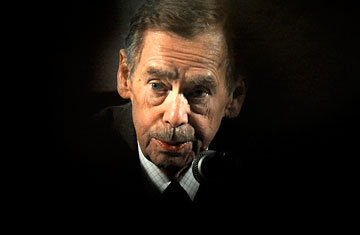
Former Czechoslovak President Vaclav Havel speaks during a presentation of the Vaclav Havel Library in Prague on March 1, 2011
(2 of 2)
Then he was President, an East European leader utterly unlike the geriatric robots who preceded him. "I assume you did not propose me for this office so that I too would lie to you," he told Czechs during his 1990 New Year's address. He stopped using expressions the old regime had made meaningless, terms like the people and citizen, what the secret police called people during interrogations. He told Czechs bluntly that a free society wouldn't fall from the sky unless they changed old thinking. "People are still full of totalitarian habits," Havel chided. "If I say, 'What an ugly dog,' there are immediately 10 people ready to shoot the dog dead." Havel performed the normal duties of Presidents, but to Czechs, his most important role was as a guide, even a talisman. Bus drivers kept his picture over the steering wheel, right next to their nudie pinups. People took the revolution-era poster that said "Havel to the Castle" and altered it to read "Havel's in the Castle." It was reassuring.
Havel's command of practical politics wasn't. He surrounded himself with a Cabinet of "intelligent amateurs" that included an actress, a cameraman, a geologist and a rock musician. And he resisted turning his high-minded band of former dissidents into a competitive political party. This gave the upper hand to Havel's rival, the slick, free-market economist Vaclav Klaus. Klaus wanted to transform the economy to capitalism as fast and with as little regulation as possible. He rolled his eyes at Havel's protests that the task of building a decent, civil society was being lost to greed. While Czechs admired Havel, Klaus appealed to their practical side. He rose to Prime Minister, determined to curb Havel's influence. When Slovakia — Czechoslovakia's poorer eastern third — groaned under the reforms and threatened secession, Klaus called its bluff and agreed, ignoring Havel's pleas for a referendum. In 1992 Havel resigned as President of the soon-to-be-defunct Czechoslovakia and returned six months later as President of the newly formed Czech Republic. He said at the time, "I don't want to be a ceremonial President who merely lays wreaths on monuments and because of that has to wear a tie all day." But that's what he became.
Toward the end of his life, Havel hit hard times. Olga died in early 1996, leaving him too lost to even help in planning her funeral. Within a year, doctors had removed half his cancerous right lung. When he got out of the hospital, Havel married the woman who had nursed him through, the actress Dagmar Veskrnova, who seemed too blond and too frivolous for many Czechs. And Havel seemed weary, even bitter. After a financial scandal that ousted his rival Klaus, Havel told Parliament it had helped build a more prosperous Czech Republic but not a more tolerant, less suspicious one. The democratic revolution had not built the civil society he had dreamd of. He himself would leave government after the end of his presidential term in 2003.
What he did leave help build, however, was an intellectual renaissance, not just for Czechs and Slovaks but also for the half of Europe that had lived behind the metaphorical Iron Curtain and was desperate to reconnect with the free West after five dehumanizing decades as Soviet satellites. Eastern Europeans had looked to Havel's writing and political activism and heard the voice of 600 years of enlightened humanism. And in the wonderful days after the Wall fell, Havel seemed best suited to compose the free verse for the entire East bloc, underscoring that it was not just the practical reality of Soviet repression but also the spiritual suppression that had been so damaging to the people of the region.
Though beset by the realities and failures of political leadership, Havel managed to avoid the irrelevance that has become the fate of Gorbachev and Walesa. The Czech presidency was largely ceremonial, and Havel's efforts to play a greater role were viewed as overreach. But he gave powerful voice to the problems of the region and to the principles that could see his country through them. When confronted by sometimes vicious and widely popular hostility to Gypsies, for example, many politicians across the region found thinly veiled ways to side against the stateless victims of the region's historic bigotry. Havel came out strongly in the Gypsies' defense, saying how they were treated would be a "litmus test" for their society. And in the face of a sometimes brutal transition to capitalism, Havel argued for a sustained humanism to provide a balance.
In the long run, those broader pronouncements have bolstered Havel's historic relevance. The shy, awkward Havel was never going to be a Churchill or a de Gaulle, but if any leader on the scene in 1989 can be said to have retained a resonant and ultimately respected voice through the difficult transition from communist to full-fledged member of Europe and NATO, Havel was it.
As a practical politician he was not a grand success. He said, "I realize I was always laughed at for being a humanist, a dreamer, a poet, instead of talking about value-added tax or something like that." But Havel was thrust into a role he did not choose: a slightly absurd role, certainly, of teaching Czechs what it means to build freedom. He came from a little country, but his message spoke to the world — a world that's now a different place without this stubborn, nervous playwright.
